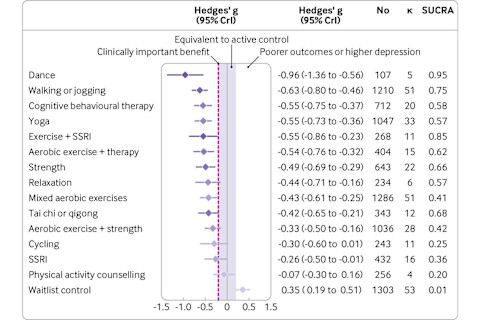4 Reasons Dance Comes Out On Top For Mental Health & Longevity

We know that exercise, broadly speaking, is great for mental health. However, many people (wrongly) think that going to the gym or doing cardio are the only "exercises" that really count, disregarding the mental health benefits of other types of movement.
Dance, for example, has been scientifically shown to improve mood and decrease mental health symptoms—in some studies, even outperforming SSRIs and other forms of exercise. Here's the latest on why dancing is so beneficial and how to make your workout routine even better for your brain.
What research says about the brain benefits of dance
Emerging research adds scientific credibility to something we already know anecdotally: Dancing has the power to make us happy.
A systematic review published in the British Medical Journal states that exercise is an effective treatment for depression, and dance can reduce depression outcomes by 96%1 when compared to controls.
Dance was actually the intervention that had the largest impact on depression in this meta-analysis—outperforming even cognitive behavioral therapy and a mix of exercise and SSRI medication.

While the study authors do caveat that these results could be skewed by the relatively small number of studies on dance for depression, their findings are still promising.
Another analysis found that dance therapy (a community-based, tailored approach to dance) significantly improved cognitive function in adults 55 and older.
Partner dancing counts too, according to a study involving a 12-week, 20-lesson Argentine tango course. "Participants in tango demonstrated improvements in whole-body spatial cognition and short-term and working memory and reduced deterioration of executive function," researchers report2.
Why it’s so effective
So, what makes dancing so beneficial for your brain and overall health? Here are some of the unique ways it engages the body and mind:
- Dance is often community-based: The really special part about dancing is that much of it is community-based—and we know that strong social connections are essential for mental health and longevity.
- Dance doubles as a creative hobby: Dance can also double as a creative hobby—and keeping up with hobbies is another well-known way to bolster mental health.
- Dance could have a sound healing element: On a previous episode of the mindbodygreen podcast, neurologist Kulreet Chaudhary, M.D., explained that exposure to certain sounds (like the beat of your favorite song) can positively impact mental health. Chaudhary gave an example where a group of people who suffered a traumatic brain injury were exposed to music therapy3 that utilized ancient sounds and mantras. "After just 30 minutes of four of those sessions, their brains started shifting. Their executive function improved and their anxiety and depression were reduced," she explained.
- Dance sparks joy: Simply put, higher levels of happiness are linked to a longer life. It's safe to say that we'd all be better off following the things that bring us joy (as cheesy as that may sound). If dancing makes you smile, laugh, and radiate happiness, it's definitely something worth investing in.
On paper, dance looks like a winner for mental health, and it lives up to the claim in practice too. One lifelong dancer and current Zumba-goer agrees with the multifaceted perks. "In addition to flexing my muscles and core with each thoughtful movement, I'm flexing my neurons (brain cells) too since dance routines involve lots of memory and cognitive flexibility," says mindbodygreen's vice president of scientific affairs, Ashley Jordan Ferira, Ph.D., RDN.
"While much of my Zumba'ing these days takes place in the privacy of my home (thanks to the wide array of free Zumba routines on the Zumba app), there's even a sense of community with the gals on my TV screen," she adds.
Still, like any hobby or exercise routine, not everyone loves to dance. If that's the case for you, just know that other forms of exercise like strength training and yoga can also be great for brain health and longevity.
What's more, you can add some dance elements to your workout regimen to make it even better for your mood. For example, try exercising to uplifting or calming music, or signing on to more group workout sessions.
The takeaway
Dance offers unique mental health benefits, including reduced depression and improved cognitive function. Due to the way it promotes community and allows for creative expression, dancing is a uniquely powerful practice. Here are more insights on the benefits of dance for older adults in particular.
